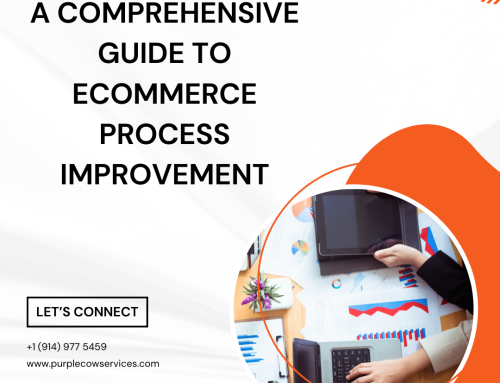The world of eCommerce is a thrilling rollercoaster, filled with opportunities, innovations, and, of course, its fair share of challenges.
Share This Story, Choose Your Platform!
Navigating these challenges successfully is the key to building a thriving online business. In this comprehensive guide, we’ll take you through the most common hurdles faced by eCommerce operations and provide actionable insights on how to conquer them with confidence.
The eCommerce Landscape
Before we dive into the challenges and their solutions, let’s take a moment to understand the eCommerce landscape. eCommerce is booming, with consumers increasingly turning to online shopping for convenience and variety. In 2020, global eCommerce sales amounted to $4.28 trillion, and this figure is expected to grow steadily in the coming years. However, this growth also means intensified competition and rising customer expectations.
To thrive in this landscape, eCommerce businesses must not only offer quality products but also deliver exceptional customer experiences. This involves a seamless shopping process, fast and reliable shipping, and responsive customer service. As you can imagine, achieving these goals comes with its fair share of challenges.
The Challenge of Inventory Management
One of the most critical aspects of eCommerce operations is inventory management. Overstocking can lead to storage issues and financial losses, while understocking can result in missed sales opportunities and disappointed customers.
The solution to this challenge lies in adopting efficient inventory management practices. Start by implementing robust inventory management software that allows you to monitor stock levels in real-time. These systems often include features like automatic reordering when stock reaches a certain threshold, making inventory control more streamlined and precise.
Additionally, consider implementing the Just-in-Time (JIT) inventory management approach. JIT aims to minimize excess inventory by ensuring that products arrive exactly when they are needed. This approach can help reduce storage costs and minimize the risk of overstocking.
Fulfillment and Shipping Dilemmas
Fulfillment and shipping are the lifeblood of eCommerce. Late deliveries, damaged products, and high shipping costs can all tarnish the customer experience. These challenges can result from a variety of factors, including inefficient warehouse operations, unreliable carriers, and inadequate packaging.
To overcome these challenges, eCommerce businesses need to prioritize efficient fulfillment and shipping processes. Consider outsourcing fulfillment to third-party logistics (3PL) providers, especially if you’re experiencing rapid growth. These experts can optimize warehouse operations, reduce shipping costs through bulk shipping rates, and enhance packaging to prevent damage.
Furthermore, leverage advanced shipping software and tools to automate and streamline the shipping process. Shipping software can help you compare carrier rates, print shipping labels, and track shipments in real-time. Additionally, providing customers with accurate tracking information and estimated delivery dates can enhance their experience and build trust.
Customer Service and Satisfaction
In the digital age, customer service remains a cornerstone of eCommerce operations. It’s not just about solving problems but also creating memorable experiences. Customer service challenges often revolve around responding to inquiries promptly, addressing issues effectively, and maintaining consistent communication with customers.
To tackle these challenges, consider implementing a multi-channel customer support system. Provide customers with various ways to reach out, such as live chat, email, phone, and social media. Ensure that your customer support team is well-trained and empowered to resolve issues quickly and efficiently.
Additionally, invest in a Customer Relationship Management (CRM) system to keep track of customer interactions and preferences. A CRM system can help you personalize communication and tailor your marketing efforts to customer behavior.
Technology and Platform Selection
Choosing the right eCommerce platform and technology stack is crucial. The wrong choice can lead to compatibility issues, security concerns, and limited scalability. Selecting the right technology is especially critical as your business grows and evolves.
Begin by conducting a thorough assessment of your current technology stack. Identify any bottlenecks, inefficiencies, or compatibility issues. Then, research and invest in the latest eCommerce technologies and platforms that align with your business goals.
Consider the benefits of cloud-based eCommerce platforms, which offer scalability and flexibility. Additionally, prioritize security measures, such as encryption, firewalls, and regular security audits, to protect your customers’ sensitive data.
Competition in the eCommerce Arena
Competition is fierce in the eCommerce world. To succeed, you must differentiate your brand, offer unique value, and continually innovate. Staying ahead of the competition requires a deep understanding of your target market and the ability to identify emerging trends.
Allocate resources to conduct market research, which provides valuable insights into customer preferences and trends. Utilize this data to customize your product offerings and refine your marketing strategies. Look for gaps in the market where you can provide unique solutions or experiences.
Innovate continuously by exploring new technologies and strategies. Embrace digital marketing, social media advertising, and content marketing to reach a broader audience. Customer feedback and reviews can also provide valuable insights into areas for improvement and innovation.
Regulatory Compliance and Data Security
eCommerce businesses must adhere to various regulations, including data privacy laws. Failure to comply can result in costly penalties and a damaged reputation. Challenges related to compliance and data security often revolve around navigating complex legal requirements and safeguarding customer data.
To address these challenges, consult legal experts who specialize in eCommerce compliance. They can provide guidance on navigating specific regulations, such as the General Data Protection Regulation (GDPR) or the California Consumer Privacy Act (CCPA).
Invest in robust data security measures, including encryption, access controls, and regular security audits. Educate your team on best practices for handling customer data and ensure that all employees understand the importance of data protection.
Adapting to Market Trends
The eCommerce landscape is ever-evolving, with new trends and technologies emerging regularly. Staying current and adapting is essential. Challenges often arise when businesses fail to keep pace with changing customer expectations and industry trends.
To stay ahead, monitor industry publications, attend eCommerce conferences, and engage in continuous learning. Stay informed about emerging technologies like augmented reality (AR), virtual reality (VR), and artificial intelligence (AI) that can enhance the customer experience.
Be agile and ready to pivot your strategies as needed. Consider conducting A/B tests for website design, product pages, and marketing campaigns to identify what resonates best with your audience. By staying adaptable and receptive to change, you can remain competitive in the ever-evolving eCommerce landscape.
Building a Strong eCommerce Operations Support System
Successful eCommerce operations rely on a robust support system. It’s essential to have the right tools, technologies, and personnel in place to tackle challenges effectively. eCommerce Operations Support encompasses everything from inventory management software to customer service teams and fulfillment partners.
Invest in advanced eCommerce management software that integrates seamlessly with your existing systems. This software can provide real-time insights into your operations, helping you identify bottlenecks and inefficiencies quickly. It can also streamline order processing, inventory management, and reporting.
Consider outsourcing certain aspects of your operations to experienced partners. For example, partnering with a 3PL provider can optimize your fulfillment process, while working with a customer service outsourcing firm can enhance customer support capabilities.
The Role of eCommerce Operations Support
eCommerce Operations Support is the backbone of your online business. It encompasses everything from inventory management software to customer service teams and fulfillment partners. These support systems are designed to streamline your operations and address challenges proactively.
For example, inventory management software can help you track product availability in real-time, enabling you to avoid stockouts or overstocking issues. It can also generate valuable reports on sales trends and inventory turnover, helping you make informed decisions.
Your customer service team plays a vital role in ensuring customer satisfaction. They are on the front lines, addressing inquiries, resolving issues, and providing valuable insights into customer preferences. By investing in continuous training and empowering your customer service team, you can elevate the overall customer experience.
When it comes to fulfillment and shipping, partnering with a reliable 3PL provider can significantly impact your operations. These experts specialize in warehousing, order processing, and shipping logistics. They can help you optimize your supply chain, reduce shipping costs, and ensure timely deliveries.
In summary, eCommerce Operations Support is the engine that drives your online business. It encompasses technology, personnel, and partnerships that work in harmony to streamline operations and overcome challenges. By investing in and optimizing these support systems, you can enhance efficiency, improve customer satisfaction, and ultimately achieve eCommerce success.
Conclusion: Triumphing Over eCommerce Challenges
The challenges in eCommerce operations are inevitable, but they are also opportunities for growth and improvement. By understanding the unique hurdles of the eCommerce landscape, staying adaptable, and investing in a robust operations support system, you can conquer these challenges with confidence. Remember, each obstacle you overcome brings you one step closer to eCommerce success.
In the fast-paced world of eCommerce, continuous learning and improvement are key. Keep monitoring industry trends, seeking innovative solutions, and gathering customer feedback to refine your operations continually. With determination, strategic planning, and the right support systems in place, you can thrive in the competitive and dynamic eCommerce landscape. Conquering challenges is not just a necessity; it’s a pathway to sustainable growth and long-term success in eCommerce.
Elevate your eCommerce success with Purple Cow‘s comprehensive Operations Support services. We specialize in streamlining your online business, conquering challenges, and ensuring seamless operations. From inventory management to customer service and logistics optimization, we’ve got you covered. Partner with Purple Cow to harness the power of our expertise and take your eCommerce venture to new heights!
Share This Story, Choose Your Platform!
In This Blog:
- The eCommerce Landscape
- The Challenge of Inventory Management
- Fulfillment and Shipping Dilemmas
- Customer Service and Satisfaction
- Technology and Platform Selection
- Competition in the eCommerce Arena
- Regulatory Compliance and Data Security
- Adapting to Market Trends
- Building a Strong eCommerce Operations Support System
- The Role of eCommerce Operations Support
- Conclusion: Triumphing Over eCommerce Challenges

















